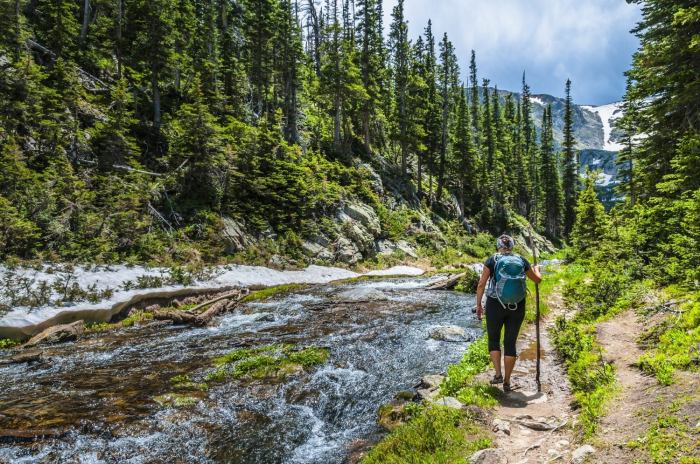Mountain Hiking Near Me? This isn’t just about finding a trail; it’s about discovering adventure right on your doorstep. Whether you’re a seasoned mountaineer or a weekend warrior, this guide unlocks the secrets to planning unforgettable hikes, from choosing the perfect path to mastering essential safety techniques. We’ll cover everything from finding the best trails using online resources and mapping tools to packing the right gear and navigating challenging terrain.
Get ready to explore the breathtaking beauty of the mountains, safely and responsibly.
This comprehensive guide dives deep into the nuances of planning a successful mountain hike. We’ll help you understand your own hiking capabilities and match them to trails that fit your skill level. We’ll explore various resources to help you locate trails near you, considering factors like difficulty, distance, and elevation. Beyond the trail itself, we’ll equip you with essential safety knowledge, packing lists, and tips for responsible environmental stewardship.
From pre-hike planning to post-hike reflection, we’ve got you covered. Prepare to transform your local mountain range into your personal playground.
Essential Information for Hikers

Planning a mountain hike requires meticulous preparation to ensure a safe and enjoyable experience. Overlooking even minor details can significantly impact your trip, turning a potential adventure into a stressful ordeal. This section Artikels essential gear, trip planning strategies, weather awareness, and Leave No Trace principles to maximize your chances of a successful and responsible hike.
Essential Hiking Gear Checklist
A well-packed backpack is your lifeline on the trail. Failing to include crucial items can lead to discomfort, injury, or even life-threatening situations. Therefore, meticulously checking your gear before each hike is paramount.
- Navigation: Map, compass, GPS device (with extra batteries). Knowing your route and having backup navigation systems is crucial, especially in unfamiliar terrain. A paper map is invaluable even with electronic devices, as electronics can fail.
- Sun protection: Sunscreen, sunglasses, hat. High-altitude sun is intense, and prolonged exposure can lead to sunburn and eye damage. Choose high SPF sunscreen and wide-brimmed hats.
- Insulation: Extra layers of clothing, including a waterproof jacket and pants. Weather in mountainous regions can change rapidly. Being prepared for unexpected rain, wind, or temperature drops is essential.
- Illumination: Headlamp or flashlight with extra batteries. Even day hikes can extend later than anticipated. A reliable light source is crucial for navigating in low-light conditions.
- First-aid supplies: Comprehensive first-aid kit, including blister treatment, pain relievers, antiseptic wipes, and any personal medications. Knowing how to use your first-aid kit is just as important as having one.
- Fire: Waterproof matches or lighter. In emergencies, fire can be crucial for signaling, warmth, or purifying water. Keep your fire starter dry and easily accessible.
- Repair kit and tools: Knife or multi-tool, duct tape, and any tools specific to your hiking gear. Being able to make minor repairs on the trail can prevent larger problems.
- Nutrition: High-energy snacks and plenty of water. Dehydration and low blood sugar can quickly sap your energy and impair judgment. Pack enough food and water for your anticipated hike duration, plus extra.
- Emergency shelter: Emergency blanket or bivy sack. Unexpected weather changes can require you to seek shelter. An emergency blanket provides warmth and protection from the elements.
Safe and Enjoyable Hiking Trip Planning
Thorough planning is the cornerstone of a successful and safe hiking trip. Failing to plan can lead to unforeseen challenges, jeopardizing your safety and enjoyment.
Start by choosing a trail appropriate for your fitness level and experience. Research the trail’s length, elevation gain, difficulty, and potential hazards. Inform someone of your hiking plans, including your route, estimated return time, and emergency contact information. This allows for timely intervention should something go wrong. Finally, always hike with a buddy; having a companion enhances safety and adds to the enjoyment of the experience.
Checking Weather Conditions Before Hiking
Mountain weather is notoriously unpredictable. Checking the forecast before you leave is not just a good idea; it’s crucial for your safety. A sudden storm can turn a pleasant hike into a dangerous situation. Consult multiple weather sources, including local forecasts, mountain-specific weather reports, and even satellite imagery to get a comprehensive understanding of the conditions. Be prepared to change your plans if the forecast indicates dangerous conditions.
For example, a sudden snowstorm in the mountains could quickly make a trail impassable and hazardous.
Leave No Trace Principles
Leaving no trace is more than just a slogan; it’s a responsibility to preserve the natural beauty of the mountains for future generations. Improper disposal of waste, damage to vegetation, and disturbance of wildlife can have long-lasting negative consequences.
Pack out everything you pack in. Dispose of waste properly, using designated receptacles or packing it out if none are available. Stay on marked trails to minimize environmental impact. Respect wildlife by observing them from a distance and never feeding them. Minimize campfire impacts by using existing fire rings or stoves, and never leave a fire unattended.
Leave what you find; avoid collecting rocks, plants, or other natural items. Respect other visitors by yielding to those heading uphill and being mindful of noise levels. For instance, leaving behind even a small piece of trash can attract animals, disrupt the ecosystem, and spoil the experience for other hikers.
Post-Hike Activities and Reflection: Mountain Hiking Near Me

Conquering a mountain trail is only half the adventure. The post-hike experience, encompassing reflection, recovery, and planning for future excursions, is equally crucial for maximizing your enjoyment and learning from each journey. Proper post-hike routines not only aid physical recovery but also cultivate a deeper appreciation for the natural world and enhance your skills as a hiker.
Effectively documenting your hikes, implementing recovery strategies, and evaluating your performance are key elements to improving your hiking experiences over time. By analyzing what went well and what could be improved, you can transform each hike into a valuable learning opportunity.
Recording and Sharing Hiking Experiences
Detailed record-keeping elevates a simple hike into a lasting memory and valuable resource for future planning. Consider employing several methods to capture the essence of your journey. A simple approach is to maintain a hiking journal, detailing the date, location, trail conditions, weather, notable wildlife sightings, and personal reflections. This provides a chronological account of your hiking history.
Beyond the written word, consider incorporating visual elements. High-quality photographs can vividly capture the scenic beauty, challenging terrain, and memorable moments of your hike. Videos offer an even more immersive experience, allowing you to relive the sounds and sights of your adventure. Sharing your experiences on social media platforms like Instagram or YouTube can connect you with fellow hikers and inspire others to explore the outdoors.
Remember to be mindful of environmental impact when sharing location details.
Post-Hike Recovery Techniques
Post-hike recovery is vital for preventing injuries and ensuring you’re ready for your next adventure. Prioritizing hydration is paramount; replenish fluids lost through perspiration with water or electrolyte drinks. Gentle stretching and light exercises can improve flexibility and reduce muscle soreness. A balanced meal, rich in protein and carbohydrates, will help your body repair and rebuild muscle tissue.
Finally, prioritize adequate rest to allow your body to fully recover from the physical demands of the hike. Ignoring these steps can lead to delayed-onset muscle soreness (DOMS) and potentially more serious injuries.
Evaluating Hike Success and Enjoyment, Mountain Hiking Near Me
Assessing the success of a hike isn’t solely about reaching the summit. It’s a multifaceted evaluation incorporating various factors. Did you achieve your personal goals for the day, such as covering a specific distance or reaching a certain elevation? Did you encounter any unforeseen challenges, and how did you overcome them? Most importantly, did you enjoy the experience?
Consider creating a simple rating system, perhaps on a scale of 1 to 5, for factors like trail difficulty, scenic beauty, and overall enjoyment. This allows for a quantifiable assessment of your experience, providing insights for future trip planning. For example, a challenging but rewarding hike might score high on difficulty but also high on enjoyment, whereas a less challenging hike with poor views might score low on both.
Learning from Experiences and Improving Future Hikes
Every hike presents an opportunity for growth and improvement. Analyzing your past experiences, both positive and negative, is key to refining your hiking strategies. Did you pack appropriately for the weather conditions? Was your pace sustainable? Did you adequately prepare for any potential hazards, such as navigating challenging terrain or encountering wildlife?
By identifying areas for improvement, you can create a checklist for future hikes, ensuring you’re better prepared and equipped to tackle any challenges that may arise. For example, if you experienced unexpected rain, you might pack a waterproof jacket and pants on your next trip. Or if you found the trail too challenging, you might choose a less strenuous route next time.
So, ditch the excuses and embrace the mountains! With the right preparation and a sense of adventure, mountain hiking near you can become a rewarding and unforgettable experience. Remember to always prioritize safety, respect the environment, and savor every breathtaking moment. This guide is your compass, leading you to incredible discoveries and empowering you to create memories that will last a lifetime.
Now go explore!

